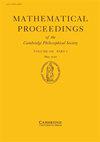如何解整数二元三次方程
IF 0.8
3区 数学
Q3 MATHEMATICS
Mathematical Proceedings of the Cambridge Philosophical Society
Pub Date : 2024-03-07
DOI:10.1017/s0305004124000057
引用次数: 0
摘要
给定任何最多有三个有理整数系数的两变量多项式,我们得到了一个新的搜索边界,可以有效地判定它是否有一个有理整数系数的零点。在此过程中,我们会遇到一个估计奇异点的自然问题。我们用基本不变理论来解决这个问题,但即使使用标准高度机的全部功能,要得到最优解似乎也不容易。本文章由计算机程序翻译,如有差异,请以英文原文为准。
How to solve a binary cubic equation in integers
Given any polynomial in two variables of degree at most three with rational integer coefficients, we obtain a new search bound to decide effectively if it has a zero with rational integer coefficients. On the way we encounter a natural problem of estimating singular points. We solve it using elementary invariant theory but an optimal solution would seem to be far from easy even using the full power of the standard Height Machine.
求助全文
通过发布文献求助,成功后即可免费获取论文全文。
去求助
来源期刊
CiteScore
1.70
自引率
0.00%
发文量
39
审稿时长
6-12 weeks
期刊介绍:
Papers which advance knowledge of mathematics, either pure or applied, will be considered by the Editorial Committee. The work must be original and not submitted to another journal.

 求助内容:
求助内容: 应助结果提醒方式:
应助结果提醒方式:


